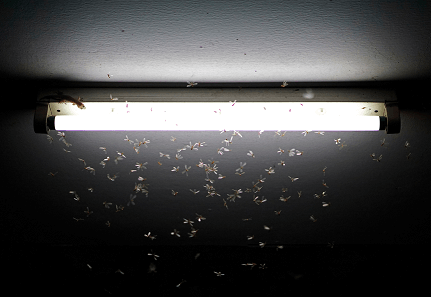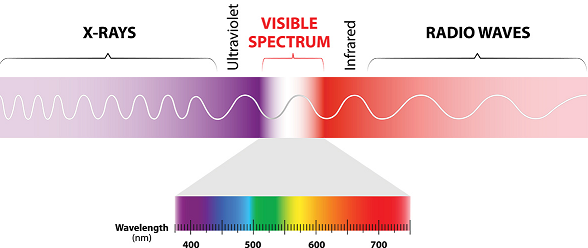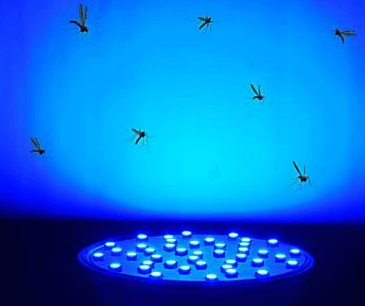So, what exactly makes them come to the light? Is it the LED light bulb which they like a lot, or is there some other reason behind this? If similar questions are going on in your mind too, make sure to read this article until the end to find the answers.
Why Are Bugs Attracted To Light?
Before blaming the LEDs for attracting too many bugs towards them, let’s decode the science behind it and learn why bugs like to fly around a light source. You must know that bugs, for instance, moths do not stay at one place their whole life. They like to travel the world as the season changes. Like the way sailors used to find their path by judging the North Star, bugs use the same technique to find their travel path using moonlight. Most bugs have unique eyes, which they use to keep track of moonlight. Keeping the moonlight at a specific angle, bugs find their way to travel. Since we as humans have placed LED lights everywhere, in our homes, in the streets, etc, for our convenience, it somehow disturbs the travelling pattern for the insects. When the light from the lamps reach the sight of bugs, they often get confused and mistakenly think of the artificial light as moonlight. That’s just one reason for the bugs to be attracted towards the lights, there’s more! Another reason for bugs to keep buzzing around the lights is because of the heat. Generally, light bulbs do emit a slight amount of radiation and heat, which makes the bugs feel comfortable in cold weather conditions. Moreover, scientists do claim that a few kinds of flowers reflect ultraviolet rays. Since the artificial lights also emit some ultraviolet rays, bugs might mistakenly think of the light as flowers. There’s not one single reason why bugs like to buzz around the lights, so what colour of lights should you use to keep the insects away? Let’s find out.
What Light Color Spectrum Attracts Insects?
To find the right light for your personal use that can also keep the bugs away, we must understand which light colour they are most attracted to? Well, don’t worry as the experts from PARS (Punjab Agriculture Research Station) have the answer for you. The people at PARS did an experiment by dividing a farm into several sections and installing different coloured lights in each of them. Later on, most of the bugs around the lights were captured for counting to find out which colour spectrum attracts the most insects. And, the results are pretty good. After the experiment, it was found that the insects are more attracted to Black (ultraviolet) light. After that, the most number of insects were captured around the Blue lights, followed up by White, Yellow, Green and Red.
So, it basically means that lights of cool colour temperatures attract more insects than hot temperature colours. However, we cannot just install a red colour light in our living room to keep the bugs away, yellow is quite a good choice to go with. Otherwise, you can stick to the white lights as well.
Blue Lights and Mosquitoes
As we discussed in the above section, blue is one of the most favourite colours of bugs. That said, we can conclude that mosquitoes, like any other bug, will also show similar behaviour. But, there’s a catch. Although bugs like the blue light and white light, as you can see it by yourself around the street lights. If you go around the same lamp in the morning, you will find many of the insects dead there only. So, even after the conditions were favourable for the insects, what makes them die eventually? Oftentimes, we see mosquito killer machines installed in places like restaurants, schools, etc. Such machines use light rods that emit blue light rays to attract the mosquitoes towards them. As soon as the mosquito comes in contact with the machine’s grill, it gives an electrical shock to the mosquito. So, it is pretty clear that mosquitoes like the blue light spectrum.
What about the mosquitoes and bugs around the street lamps? Although the blue light attracts the bugs, the over-exposure to such a light spectrum destroys the cells present in an insect’s body, making them weak from inside. Whatever the blue light does to the insects, it’s not a practical choice to install blue light in our homes as it’s quite harmful to us, humans as well.
What About Yellow Light?
We often see lights marketed as bug repellent lights, which is wrong and misleading. There’s no such light spectrum that can make the bugs go away, or kill them. The yellow spectrum of light is not the most attractive colour in an insect’s eyes. That’s the reason we don’t see a large group of bugs around them, but that does not make them bug repellent to be precise. It’s just that yellow lights attract fewer bugs than other lights such as black and blue. So, if you are looking for the right light colour for your home, yellow lighting is still a far better option than white or blue, if you seriously hate bugs! Warmer colours like yellow are even comfortable for human eyes, so this is a good colour choice.
What Are The Best Lights To Repel Bugs?!
Well, as such no light is specifically made to repel bugs. No matter what colour of light you install in your home, insects will come, that’s natural. However, the best you can do is to choose the lights of colour which is least attractive to insects. It is proven that insects often get attracted to cool colours such as blue and black. So, by using the warmer colour LED lights in your home, you have the best chances to keep most of the bugs out of your home.
Summary
In all, we can say that insects do like lighting, no matter what colour it is! It’s just that few colours are their favourite such as blue and black (ultraviolet). The bug repellant lights are just a market gimmick which is misleading a lot of people. However, if you know the science behind it, you won’t fall into such marketing traps. To simplify it down for you, you must always remember that warm colours like yellow attract the least amount of insects, while cool colours like white and blue attract comparatively more bugs. With this knowledge, you can purchase the right coloured lights for decoration in your home while avoiding the bugs at the same time. In case of any further queries related to this topic, feel free to ask us in the comments. Comment * Name * Email * Website
Δ








![]()